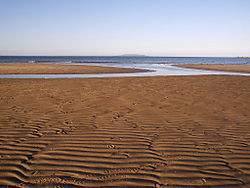Burrow Beach Hole in the Wall Beach [1] | |
|---|---|
Beach | |
 The beach facing north to Lambay island at low tide | |
| Coordinates: 53°23′33″N6°06′06″W / 53.3925°N 6.1017°W | |
| Location | Sutton, Dublin |
| Dimensions | |
| • Length | 1.2km |
| Access | From Burrow Road |
Burrow Beach, also known as the Hole in the Wall locally, is a beach in Sutton, in Fingal, County Dublin, Ireland. It neighbours Claremont Beach by Howth village, and, across the water (the exit of the inlet of Baldoyle Bay), Portmarnock Strand. It is served by a lifeguard during the summer months and is a green flag beach.

